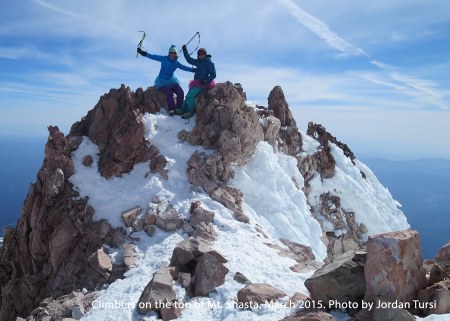
by Steve Scher
Flying back from San Francisco recently, our route took us directly over Mount Shasta. I looked down right onto the top of the brown peak, speckled with a few snowfields. I still remember when it was the snow covered obelisk, glistening, beckoning, forbidding against a blue horizon. The snowpack is dwindling, the glaciers disappearing. The old volcano is changing. Again.
Climate change is a good term. The climate changes. That is not in dispute.
We live in a world of change. We see it daily with the rise and the setting of the sun, with the growth and flowering and fruiting of plants, with the birth and death of spiders and our beloved pets and our family members. If we think the regularity of our cycles indicates sameness, we should probably just chalk that up to the good old human habit of creating order out of the unfolding relentlessness of time and space.
When it suits us, we embrace change. New job, new lover, new house, whoopee! And we often tell ourselves there is more to come; there is more good stuff just ahead. It is not so quickly cuddled when it goes off in another direction, lost job, lost lover, repossessed car, homeless. Change is gonna come, that’s the given. It won’t always feel good.
There is an order to the universe, but whether a blue planet spinning a little longer around our still yellow sun is a part of it, well that is a little harder to discern, though humans try.
We can agree that there are the rules to the physics of the place though. We know cells split, tectonic plates shift, our brains crave love. And hence, our understandings of the science of climate change. Heck, hence our understandings of change
at all.
Ashes to ashes and all that. The cells that I call me, once having served as the cells of what I call butterfly in what I call a jungle in South America or a sand dune in Africa will soon enough be worm food and fish bait and maybe a few bits of a Gray whale. If the planet keeps working for all the oxygen breathers, that is.
It’s too late to hold back our impact on this planet. We have made the changes and put more into motion. The watchword now is adaptation, which philosophically incorporates the concept of change and yet gives us a way to think towards a future. That old human habit again, creating order, seeing a future — making the changes we need to make in order to be a part of what keeps on changing.
Steve Scher is a teacher at the University of Washington. Prior to his teaching career, he was a long-time public radio host on KUOW in Seattle and has interviewed countless individuals over the past three decades. He chose to live in the Pacific Northwest, drawn by the mountains and the sea.
 Steven Scher
Steven Scher